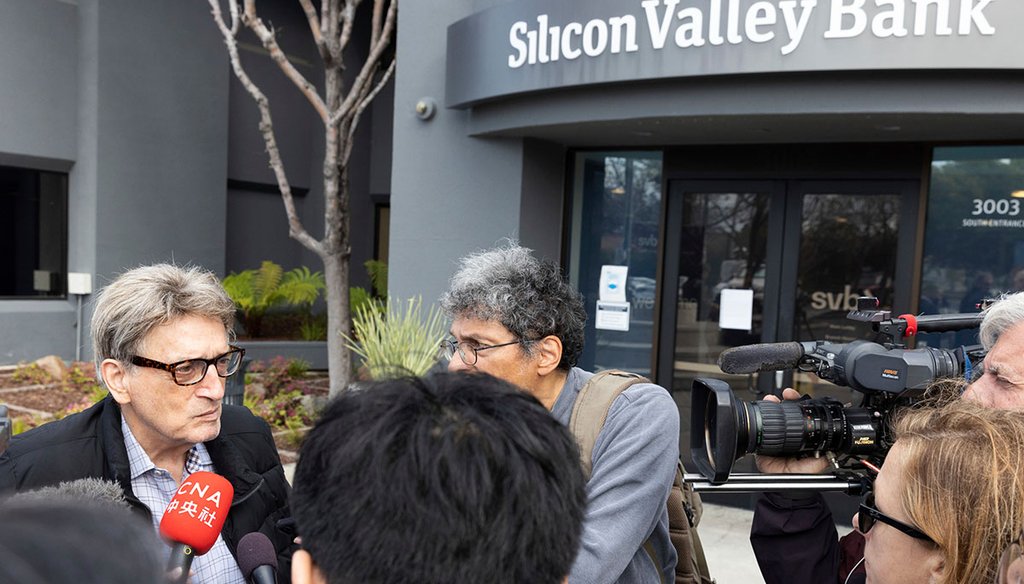Stand up for the facts!
Our only agenda is to publish the truth so you can be an informed participant in democracy.
We need your help.
I would like to contribute

A Silicon Valley Bank customer meets the press March 13, 2023, after exiting the bank’s headquarters in Santa Clara, Calif. (AP)
If Your Time is short
• Silicon Valley Bank collapsed following a bank run, a situation in which a large number of clients, fearing that their deposits won’t be repaid, all withdraw their money at the same time.
• Liberals blamed banking regulation changes by former President Donald Trump's administration for making the collapse likelier. Banking experts said the change probably did factor in the collapse, but was not solely responsible.
• Conservatives, meanwhile, blamed Silicon Valley Bank's "woke" investments — those that promote environmental and social goals — for the collapse. Experts we reached were dubious.
The spectacular implosion of Silicon Valley Bank, a top lender to technology companies and startups until a few days ago, has prompted finger-pointing from the political left and right about why it happened and who is at fault.
Silicon Valley Bank, now the second-largest bank to collapse in U.S. history and the largest since the 2008 financial crisis, experienced what is known as a bank run — when a large number of clients, fearing the bank won’t be able to repay their deposits, all try to withdraw their money at the same time. With demand for withdrawals outstripping the ready supply of cash, a bank in this situation is doomed to fail.
The panic began after Silicon Valley Bank announced it sold $21 billion worth of its investments at a nearly $2 billion loss. The bank did this because it needed to free up money to meet withdrawal demands. The bank’s tech-focused client base was particularly hungry for cash after influxes from venture capital firms slowed in recent months.
Some Democrats, including Sen. Elizabeth Warren of Massachusetts and Rep. Katie Porter of California, blame bipartisan legislation signed in 2018 by then-President Donald Trump that eased regulations for all but the largest banks, including institutions like Silicon Valley Bank.
"No one should be mistaken about what unfolded over the past few days in the U.S. banking system," Warren said in an op-ed in The New York Times. "These recent bank failures are the direct result of leaders in Washington weakening the financial rules."
In remarks about the bank failure March 13, President Joe Biden echoed such concerns, saying, "Unfortunately, the last administration rolled back some of these requirements. I’m going to ask Congress and the banking regulators to strengthen the rules for banks to make it less likely this kind of bank failure would happen again and to protect American jobs and small businesses."
Meanwhile, Republicans blamed the bank’s demise on what they call "woke" policies, such as Silicon Valley Bank’s commitment to diversity and equity programs and its adherence to environmental, social and corporate governance.
Florida Gov. Ron DeSantis told Fox News' Maria Bartiromo that Silicon Valley Bank was too "concerned with DEI and politics," which he said "really diverted from them focusing on their core mission."
Banking experts said political point-scoring after the collapse was predictable.
"Every systemic collapse provides all sides with bases for finger pointing," said Lawrence G. Baxter, a law professor at Duke University and director of its Global Financial Markets Center.
Here, we’ll look at the evidence for and against each of these theories regarding the bank’s downfall, with the caveat that the internal workings of Silicon Valley Bank are still being unearthed.
The role of the 2018 legal changes
The legislation signed by Trump in 2018 represented a scaling back of the landmark Dodd-Frank Act, which lawmakers passed in 2010 and then-President Barack Obama signed. The 2010 measure was designed to increase financial services regulation in a way that would avoid a repeat of the crisis that tipped the nation into the Great Recession.
The Dodd-Frank bill, passed mostly by congressional Democrats with a smattering of Republican support, overhauled and strengthened the nation’s financial regulatory system, tightening restrictions on speculative or risky investments and instituting "stress" tests on banks to make sure they could survive difficult financial scenarios.
The 2018 revisions of Dodd-Frank, formally known as the Economic Growth, Regulatory Relief and Consumer Protection Act, maintained stringent oversight for the largest banks but eased regulations for smaller and midsized banks. Whereas the original Dodd-Frank law mandated stricter capital and liquidity standards for institutions with $50 billion in assets, the rewrite raised the minimum for such requirements to those with at least $250 billion in assets. The bill passed with the support of all but one Republican and of 33 Democrats in the House and all Republicans and 17 Democrats in the Senate.
Silicon Valley Bank CEO Greg Becker was among those who sought lighter regulations for smaller banks as the rollback bill was being crafted. At the time the bill was passed, Silicon Valley Bank had about $40 billion in assets. That had grown to $212 billion by the time the bank crumbled, but that still would have shielded the bank from many key regulations, including standards for how much capital the bank kept on hand (keeping more capital allows banks to fulfill depositor withdrawals in a crisis) and for liquidity (more liquid holdings enable banks to quickly convert value into cash if needed).
Supporters of the 2018 rewrite "ignored the fact that while a failing or failed bank may not destabilize the entire national banking system, it sure can destabilize a region," Mayra Rodriguez Valladares, a financial consultant, wrote recently in Forbes.
Experts in banking regulation told PolitiFact that the 2018 changes probably did hasten Silicon Valley Bank’s downfall.
"It did indeed reduce regulatory requirements for banks like Silicon Valley Bank," said Hilary Allen, an American University law professor. "While it is impossible to say categorically that legislative rollback equals the bank’s collapse, it does seem that it made it more likely."
Baxter agreed with Allen.
"Relaxing some of the regulation for regional banks sent a signal that they were not a threat to economic stability, which is naive, as we have seen," he said.
But Baxter added that the bank failure cannot be blamed solely on the change in the Dodd-Frank law. He and others said the bank’s heavy reliance on one sector — high-tech startups — was ill-advised and should have been rectified sooner regardless of the changes to the law.
"Why did the San Francisco Federal Reserve hold back when everyone knew that Silicon Valley Bank was heavily exposed to the tech industry and its investments were deteriorating?" Baxter said. "The triggers for regulatory action, still in place even after the 2018 partial deregulation, were not followed."
Another problem, Baxter and others said, was that the bank was caught flat-footed when the Federal Reserve began raising interest rates in response to high inflation starting in mid-2022. The bank had substantial holdings in bonds, which are considered safe but which lost value when interest rates rose. That’s because investors would prefer to buy newer bonds with higher rates, meaning that those stuck holding bonds need to sell them at a discount if they want to generate quick cash.
Silicon Valley Bank was allowed to build up a "massive position" on bonds with "little to no hedging for interest rates," said Aaron Klein, a senior fellow in economic studies at the Brookings Institution, a Washington, D.C., think tank.
At the same time, the bank’s depositors maintained large holdings beyond the basic $250,000 level that is insured by the Federal Deposit Insurance Corp., to a degree that misaligned with more traditional banks, Klein said.
"Silicon Valley Bank is not a ‘Main Street bank’ and never was," Klein said. "Most banks of that size have 1,000 branches, but Silicon Valley had 16. Its assets quadrupled in four years — explosive growth that ought to raise flags."
The emergence of lightspeed online information sharing on social media platforms has heightened the risks for banks and their depositors in a way that regulators have not caught up to, Allen said. Silicon Valley Bank had "a quite insular and ‘very online’ deposit base through which rumors could spread very quickly," making a bank run even faster and more harmful, Allen said.
Experts rebut notion that "woke" policies prompted collapse
What about the role of "woke" policies? Several high-profile Republicans and a presidential hopeful argued that Silicon Valley Bank's promotion of diversity equity and inclusion, or DEI, initiatives and environmental, social and governance, or ESG, investments led to its downfall.
DeSantis, U.S. Rep. James Comer of Kentucky and Republican presidential candidate Vivek Ramaswamy echoed that sentiment in comments to Fox News.
"Now we see coming out that they were one of the most 'woke' banks in their quest for the ESG-type policy," Comer said March 12. "This could be a trend, and there are consequences for bad Democrat policy."
Silicon Valley Bank's 2022 Environmental, Social and Governance report detailed more than $17 billion in planned investments. They included:
• An $11.2 billion community benefits plan to support small businesses, finance affordable housing, reinvest in low- and moderate-income communities in Massachusetts and California by 2026, and support charitable causes through philanthropy and volunteering.
• $1.3 billion in residential mortgages to low- and moderate-income communities and borrowers and in low- and moderate-income communities census tracts by 2026.
• $5 billion in sustainable finance commitment; the company would invest this money by 2027 into helping clients build sustainable businesses. The bank also aimed to have its operations carbon-neutral by 2025.
But experts told PolitiFact that none of the policies or investments conservatives highlighted would have created the key conditions that prompted the sudden nosedive.
"No, I don't see this playing any role," Allen said. "For this critique to have any plausibility, Silicon Valley Bank would have to have made 'woke' investments that failed and caused it to implode."
Also, many financial institutions have made similar investments without prompting a bank run. The accounting and consulting firm PricewaterhouseCoopers projected in October that U.S. investments in environmental, social and governance-related assets would increase to $33.9 trillion in 2026.
Robert Lawless, a University of Illinois at Urbana-Champaign law professor, an expert in consumer finance and business law, agreed that "wokeness" didn't cause the bank’s collapse.
"It had nothing to do with it," Lawless said. "It's like saying, 'Why isn't 'blue' the answer to one plus one?’' It's Banking 101. That's what was going on."
Correction, March 14, 2023: James Comer is a representative from Kentucky. An earlier version of this story misstated his state.
Our Sources
Elizabeth Warren, "Silicon Valley Bank Is Gone. We Know Who Is Responsible," March 13, 2023
Silicon Valley Bank, Diversity, Equity and Inclusion, accessed March 13, 2023
Silicon Valley Bank, Environmental, Social and Governance report, accessed March 13, 2023
Fox Business, "Silicon Valley Bank collapse: GOP's Vivek Ramaswamy says more regulation would encourage 'crony capitalism,'" March 12, 2023
Fox Business, "Liberals blame Trump for Silicon Valley Bank collapse citing 2018 bipartisan bill," March 11, 2023
Fox News, "Maria Bartiromo breaks down the Silicon Valley Bank collapse with Speaker McCarthy, Gov. Ron DeSantis," March 12, 2023
Roll Call, "Biden raps 2018 bank changes, asks lawmakers to toughen rules," March 13, 2023
PricewaterhouseCoopers, ESG-focused institutional investment seen soaring 84% to U.S. $33.9 trillion in 2026, accessed March 13, 2023
Mayra Rodriguez Valladares, "How Trump’s Deregulation Sowed The Seeds For Silicon Valley Bank’s Demise," via Forbes, March 12, 2023
The New York Times, "Congress Approves First Big Dodd-Frank Rollback," May 22, 2018\
CNN, "How does a bank collapse in 48 hours? A timeline of the SVB fall," March 13, 2023
Vox.com, "9 questions about Silicon Valley Bank’s collapse, answered," March 13, 2023
NBC News, "Silicon Valley Bank collapse puts new spotlight on a 2018 bank deregulation law," March 13, 2023
Insider, "Bernie Sanders says Silicon Valley Bank's failure is the 'direct result' of a Trump-era bank regulation policy," March 13, 2023
Phone interview with Robert Lawless, University of Illinois at Urbana-Champaign law professor, March 13, 2023
Email interview with Aaron Klein, senior fellow in economic studies at the Brookings Institution, March 13, 2023
Email interview with Lawrence G. Baxter, law professor at Duke University and director of its Global Financial Markets Center, March 13, 2023
Email interview with Hilary Allen, American University law professor, March 13, 2023













































